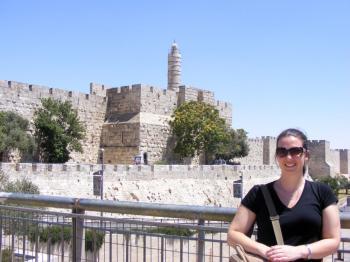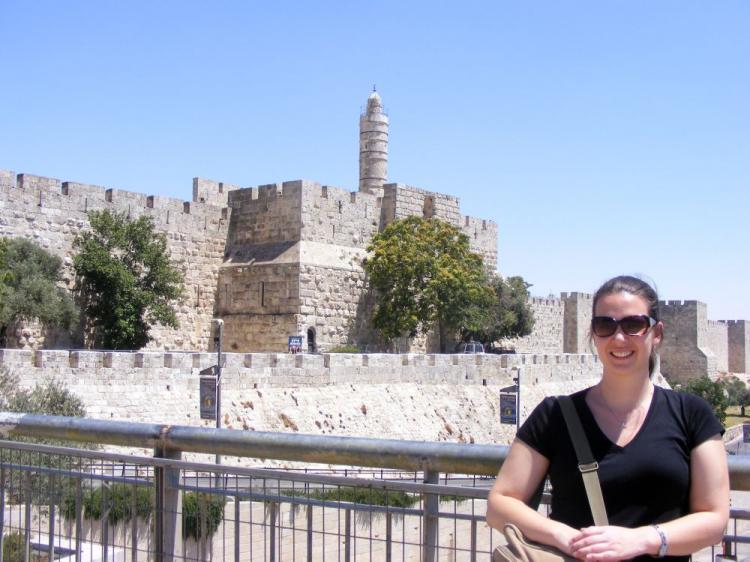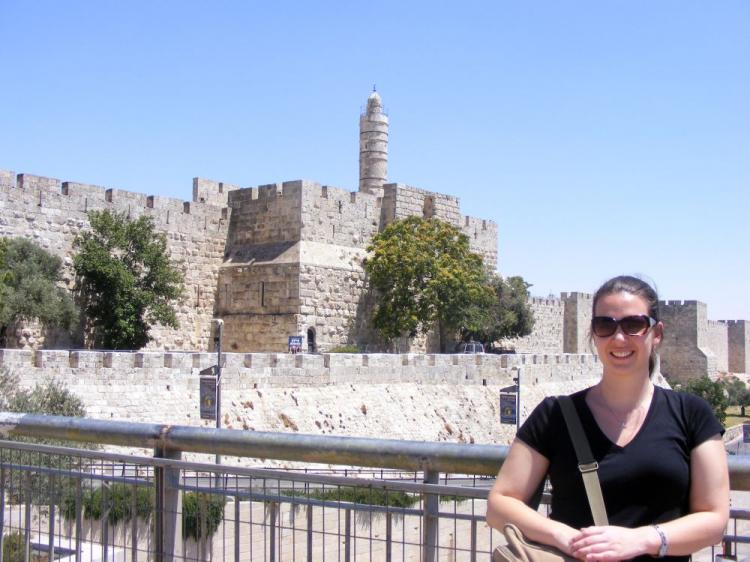Israel is the kind of place that Americans think they know all about. It is in the news so frequently, it’s easy to blithely say we are familiar with it. But ask an average American like me to give some details about Israeli culture, history, or politics, and you might get a strange answer. Something along the lines of terrorist bombings or hummus, or maybe a movie title. Anyone seen Steven Spielberg’s movie, “Munich”? Well, I didn’t get it, but the acting was great.
Despite our shocking ignorance about the rest of the world and Israel in particular, never let it be said that Americans don’t know how to fake it until they make it. It happens to be a favorite pet phrase of ours that reflects the national demeanor of conquering the unknown with hapless abandon. In other words, Americans like to bluster their way through unfamiliar situations. Hey, it was our founding fathers’ general approach to breaking away from England. It seemed like a good idea, they just made it up as they went along, and it’s worked so far.
Fast-forward 233 years to Tel Aviv, Israel, and there I am, an American sitting in Ben-Gurion International Airport at 5:30a.m. Or 05:30 as they say it in Israel. (Who came up with that idea, anyway?) Anywhere can be disorienting at dawn after getting off a trans-Atlantic flight. But I was totally bewildered. The diversity of distinct cultural groups mingling about me, the warmth of the air so early, and the vast ocean of a language I don’t speak being uttered at every turn was like a merry-go-round. It was less of a first impression, and more of a warning: you’re not in Kansas anymore.
But time heals all wounds. Or rather, food does. My favorite thing about Israel after a week and a half here is the breakfast, or “Israeli breakfast”, as I have heard it called. The milieu of eggs, cucumber and tomato salad, olives, toast, hummus, tahini, yoghurt, and on and on is a fascinating experience for the American palate. When you’re used to bagels with cream cheese or cold cereal with milk and huge cups of strong coffee, eating vegetables before 1:00p.m., (oops—13:00) is an exotic dining experience.
One thing I was skeptical about in Israel at first was the coffee. I am still not sure if it can really be called coffee, since it is actually Nescafe instant coffee. In a perfect world, coffee is brewed, not born from a mysterious powder and then combined with milk and a teaspoon of sugar. Yet, strangely, it took only 1 or 2 days for the Israeli version of coffee to grow on me, and now I drink it more than once a day. At least it’s a bit easier to take than the Arabic coffee with spices I was served in small cups in the West Bank. If American university students had access to that stuff, they’d be effortlessly pulling all-nighters and demanding that coffee chains carry it in Grande cups!
Once you get past the strange experience of drinking piping hot coffee in the sweltering Mediterranean climate, it’s actually quite nice to have a cup of Nescafe in the evening while sitting outside and chatting with friends. Let me rephrase that. In Israel, chatting seems to be a national pastime that has no equal in form and longevity. As an outsider to the culture, if you’re someone who is attached to debate and pontification, you could be in for some very, very, very long conversations. The first time you have a marathon “chatting” session with some Israeli friends, you think, “Ah, what a great talk we had! Israeli people are so vivacious and full of interesting things to say!” The second or third time it happens, it starts to dawn on you that this is the norm, and not the exception. An after-dinner chat could turn into a 3 hour gab-fest that only ends when someone’s phone rings, their stream of consciousness is interrupted , and they realize it’s already 11:30. Oh, I’m sorry—24:30. Anyway, it’s late.
Phone calls have other uses in Israeli life, aside from the obvious function of communication. The cell phone seems to act as a sort of lightning rod that makes the person getting the call spring into action. They could have been sitting motionless in a chair resting comfortably for over an hour, but when the phone rings it’s suddenly an excuse to leap out of their chair or start pacing around the house. In extreme instances, the phone gets passed to another person, or a second phone rings and phones are exchanged. Americans love their cell phones, too, but we’re more prone to walking down the street and yelling at the person on the other end or sending meaningless text messages rather than throwing a phone call into the middle of a face-to-face conversation.
There are also small expressions that have popped up everywhere during my time in Israel. My personal favorite is, “Of course”. Say you comment to someone on a particularly hot day in Tel Aviv that it seems very warm. They will probably say, “Of course,” and then go on to tell you why you should have known that. There’s the geography, the climate, the time of year. “Of course it’s hot, you silly American.” Other instances aren’t as obvious as the weather, but since Americans love to state the obvious as conversation fillers, an interaction between an Israeli and an American could leave the American feeling a little sheepish. “Of course, I should have known that the 1967 war was a turning point in modern Israeli life,” the American might silently berate himself.
Of course, Americans also have a serious guilt complex about a wide variety of things. Personally, as an American I discovered after 3 days in Israel that I have a love of apologizing for the most minor infringements or possible intrusions. “Oh, you had to give me a ride—sorry for troubling you!” Or when meeting a friend, “Sorry for making you wait!” We can’t help it, we feel guilty. Even if we’re not sure why, it makes us feel better to apologize all the time. But in Israel you can’t get say sorry for long without being asked, “Why are you apologizing for everything?” It’s a good question to which I don’t have the answer.
The best part of being in Israel is the people, despite all the cultural differences. As an American, once you get past the blunt manner of the people in this tiny country, you see they are very strong and funny people, who love life and live to experience every moment. Now if they could only realize that Nescafe is not really coffee.
Despite our shocking ignorance about the rest of the world and Israel in particular, never let it be said that Americans don’t know how to fake it until they make it. It happens to be a favorite pet phrase of ours that reflects the national demeanor of conquering the unknown with hapless abandon. In other words, Americans like to bluster their way through unfamiliar situations. Hey, it was our founding fathers’ general approach to breaking away from England. It seemed like a good idea, they just made it up as they went along, and it’s worked so far.
Fast-forward 233 years to Tel Aviv, Israel, and there I am, an American sitting in Ben-Gurion International Airport at 5:30a.m. Or 05:30 as they say it in Israel. (Who came up with that idea, anyway?) Anywhere can be disorienting at dawn after getting off a trans-Atlantic flight. But I was totally bewildered. The diversity of distinct cultural groups mingling about me, the warmth of the air so early, and the vast ocean of a language I don’t speak being uttered at every turn was like a merry-go-round. It was less of a first impression, and more of a warning: you’re not in Kansas anymore.
But time heals all wounds. Or rather, food does. My favorite thing about Israel after a week and a half here is the breakfast, or “Israeli breakfast”, as I have heard it called. The milieu of eggs, cucumber and tomato salad, olives, toast, hummus, tahini, yoghurt, and on and on is a fascinating experience for the American palate. When you’re used to bagels with cream cheese or cold cereal with milk and huge cups of strong coffee, eating vegetables before 1:00p.m., (oops—13:00) is an exotic dining experience.
One thing I was skeptical about in Israel at first was the coffee. I am still not sure if it can really be called coffee, since it is actually Nescafe instant coffee. In a perfect world, coffee is brewed, not born from a mysterious powder and then combined with milk and a teaspoon of sugar. Yet, strangely, it took only 1 or 2 days for the Israeli version of coffee to grow on me, and now I drink it more than once a day. At least it’s a bit easier to take than the Arabic coffee with spices I was served in small cups in the West Bank. If American university students had access to that stuff, they’d be effortlessly pulling all-nighters and demanding that coffee chains carry it in Grande cups!
Once you get past the strange experience of drinking piping hot coffee in the sweltering Mediterranean climate, it’s actually quite nice to have a cup of Nescafe in the evening while sitting outside and chatting with friends. Let me rephrase that. In Israel, chatting seems to be a national pastime that has no equal in form and longevity. As an outsider to the culture, if you’re someone who is attached to debate and pontification, you could be in for some very, very, very long conversations. The first time you have a marathon “chatting” session with some Israeli friends, you think, “Ah, what a great talk we had! Israeli people are so vivacious and full of interesting things to say!” The second or third time it happens, it starts to dawn on you that this is the norm, and not the exception. An after-dinner chat could turn into a 3 hour gab-fest that only ends when someone’s phone rings, their stream of consciousness is interrupted , and they realize it’s already 11:30. Oh, I’m sorry—24:30. Anyway, it’s late.
Phone calls have other uses in Israeli life, aside from the obvious function of communication. The cell phone seems to act as a sort of lightning rod that makes the person getting the call spring into action. They could have been sitting motionless in a chair resting comfortably for over an hour, but when the phone rings it’s suddenly an excuse to leap out of their chair or start pacing around the house. In extreme instances, the phone gets passed to another person, or a second phone rings and phones are exchanged. Americans love their cell phones, too, but we’re more prone to walking down the street and yelling at the person on the other end or sending meaningless text messages rather than throwing a phone call into the middle of a face-to-face conversation.
There are also small expressions that have popped up everywhere during my time in Israel. My personal favorite is, “Of course”. Say you comment to someone on a particularly hot day in Tel Aviv that it seems very warm. They will probably say, “Of course,” and then go on to tell you why you should have known that. There’s the geography, the climate, the time of year. “Of course it’s hot, you silly American.” Other instances aren’t as obvious as the weather, but since Americans love to state the obvious as conversation fillers, an interaction between an Israeli and an American could leave the American feeling a little sheepish. “Of course, I should have known that the 1967 war was a turning point in modern Israeli life,” the American might silently berate himself.
Of course, Americans also have a serious guilt complex about a wide variety of things. Personally, as an American I discovered after 3 days in Israel that I have a love of apologizing for the most minor infringements or possible intrusions. “Oh, you had to give me a ride—sorry for troubling you!” Or when meeting a friend, “Sorry for making you wait!” We can’t help it, we feel guilty. Even if we’re not sure why, it makes us feel better to apologize all the time. But in Israel you can’t get say sorry for long without being asked, “Why are you apologizing for everything?” It’s a good question to which I don’t have the answer.
The best part of being in Israel is the people, despite all the cultural differences. As an American, once you get past the blunt manner of the people in this tiny country, you see they are very strong and funny people, who love life and live to experience every moment. Now if they could only realize that Nescafe is not really coffee.







